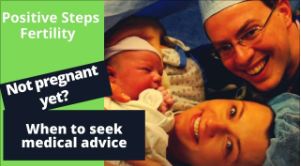There’s a common question I’m often asked: “is infertility genetic?”
You might think genes play a major role in determining fertility, but that’s generally not the case. The fact is, each couple’s fertility journey is unique and a number of external factors, such as lifestyle choices and environmental causes, are often more to blame than a person’s DNA.
For instance, great genes won’t matter much for someone who’s a heavy smoker or has pelvic scarring from an STD.
That being said, let’s dig a little deeper.
Non-genetic risk factors that impact fertility
There are many external factors that impact your personal fertility journey. Here are just a few.
A major medical event can impact reproductive outcomes.
There are a number of major medical episodes that can act as a hindrance on fertility. Some examples include chemotherapy, radiation, or surgery that removes part of the reproductive system.
Autoimmune diseases: inflammation caused by autoimmune diseases such as diabetes, thyroiditis, and lupus can all cause the ovaries to seem older than they really are, lowering a woman’s fertility in the process.
A number of lifestyle and environmental factors can negatively influence fertility as well . These include:
- Poor nutrition
- Being overweight or underweight
- Lack of exercise
- Stress
- Environmental hazards
- Nicotine
- Illicit substances
- Alcoholism
- Too much caffeine
The detrimental impact of nicotine is just one example of how non-genetic factors can undermine fertility. Heavy smoking in women can lower egg count, while reducing sperm count and quality in men as well. The amount and length of time spent smoking matters because it lowers a woman’s chances of getting pregnant. Some even argue that tobacco use can drop your fertility by roughly 40%. In other words, the longer the time spent smoking, the bigger the hit to the ovaries.
Other external factors can also affect your ability to ovulate, conceive, or carry a pregnancy to term:
- Excessive, or very low, body fat can affect ovulation and fertility
- Chronic diseases, such as diabetes, hyper or hypothyroidism, lupus, arthritis, hypertension, or asthma
- Abnormal pap smears which have resulted in treatment such as cryosurgery or cone biopsy
- Having a mother who took synthetic hormones when she was pregnant with you.
Age: Even if your fertility does not seem at risk now, remember that fertility declines with age. A woman in her late 30’s is about 30% less fertile than she was in her early 20’s. As you age, a higher percentage of the eggs inside your ovaries develop genetic abnormalities. Older eggs are more likely to accumulate errors in their DNA, leading to more genetically abnormal eggs.
Sexually Transmitted Diseases (STDs) Pelvic inflammatory disease is an infection of a woman’s reproductive organs arising from STDs like chlamydia and gonorrhea. An STD that obliterates the fallopian tubes, for instance, is yet again a component of infertility that has nothing to do with genetics.Genetic factors that do matter to infertility
It has been estimated that nearly 50% of infertility cases ARE due to genetic defects.
Genetic factors that do matter to infertility
It has been estimated that nearly 50% of infertility cases ARE due to genetic defects.
For example, if other women in your family have suffered premature menopause, endometriosis or other factors, you may be at increased risk for experiencing the same problems.
Examples of how genetics play a role in infertility
1. Early Menopause
Women whose mothers went through early menopause may be more likely to experience menopause prematurely themselves. A 2015 study by the NIH, noted that “Genetic variants are known to contribute to approximately 50% of the variation in age at menopause.”
What is early menopause?
Early menopause, also known as premature menopause, means a woman’s ovaries have spontaneously stopped working before age 40. Women can be affected in their teens or early 20s. About one in 1000 women reach menopause before the age 30.
Are there genetic factors associated with early menopause?
According to the NIH, “The heritability of menopausal age has been estimated to be between 30% and 85%, indicating a substantial genetic component to this complex trait, and a significant proportion (15–30%) of cases are familial”
2. PCOS
Polycystic Ovarian Syndrome (PCOS) is another example of genetic impact on fertility that can run in families. PCOS is fairly common, affecting 1 in 10 women. It affects the body by creating a hormonal imbalance that can lower egg count and quality in women. Women who end up gaining weight because of PCOS often experience irregular menstrual cycles. As a result, they release fewer eggs, making it harder for them to get pregnant.
3. Uterine Fibroids
A family history of fibroids can also impact a woman’s chances of getting pregnant.
Uterine fibroids are benign (noncancerous) tumors in the uterus. They exist in about 20% of women of reproductive age, but are far more prevalent in women of African-American descent. It is unclear what causes them, but experts believe it to be a mixture of genetic and environmental factors. Not all fibroids necessarily impact fertility, but size and location do play a significant role. However, a large number of uterine fibroids almost always decrease a woman’s odds of conceiving.
4. Endometriosis
Endometriosis is a disease in which uterine tissue is found outside of the uterus, such as on the ovaries, fallopian tube, or even the bladder and bowel. The condition can appear in menstruating women of all ages, including teens. While the connection between endometriosis and infertility is not clearly understood, early detection may result in successful control and preservation of fertility.
There clearly is a genetic component to endometriosis, however, given that it often appears in female members of the same nuclear family. What is more, it appears to be an inheritable trait from both the paternal or the maternal family line.
What kinds of genetic tests are available for fertility?
Genetic testing examines DNA, which has been called the instruction kit for the body’s functioning. Testing can help determine whether you carry a genetic defect that impacts your fertility. Some testing examples include:
Genetic carrier screening (including the gene for fragile X syndrome): Women who are carriers of fragile X are at increased risk to have primary ovarian insufficiency (POI), which occurs when the ovaries stop functioning normally before the age of 40.
Karyotype: A blood test to analyze the number and structure of one’s chromosomes. A karyotype can detect Turner syndrome and chromosome rearrangements.
Y-chromosome microdeletion analysis is a blood chromosome test available to men with a very low sperm count. The Y chromosome contains many genes critical for male fertility. If a small portion of the Y chromosome is missing, this can impact a man’s sperm production.
A Final Note
It matters less whether or not your parents had a history of reduced fertility – and matters more where you are personally in your fertility journey. There are numerous external factors, lifestyle choices and environmental causes that contribute to infertility. And, yes, infertility can be a difficult emotional and physical experience. But you don’t have to endure it alone.See a fertility specialist, get evaluated, and take control of your reproductive choices.
Dr. Preston Parry
Positive Steps Fertility
#Infertility
All content on this Web site, including medical opinion and any other health-related information, is for informational purposes only and should not be considered to be a specific diagnosis or treatment plan for any individual situation.




